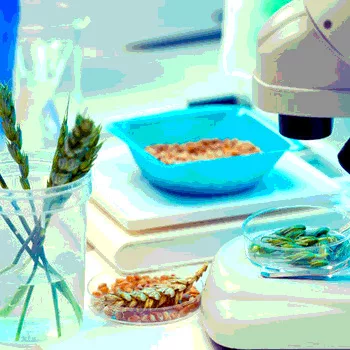GMOs or GM-“NO”s?

As the world’s population continues to increase exponentially, it is becoming more and more necessary to maintain a method to adequately feed the masses. Most citizens in western countries have grown accustomed to a certain lifestyle, one which depends on instant gratification and near infinite food-selections always available within reach. Consequently, as a society progresses, naturally so does its technological capabilities and the food industry has been no stranger to this. In the past few decades, the use of genetically modified organisms (GMOs), aided by morally questionable and much scrutinized corporate conglomerates such as Monsanto, has skyrocketed, and if the industry remains on the same path, GMOs may soon make up a considerable portion of the available food supply. Most of the controversy surrounding GMOs arises from the potential negative environmental and health benefits their extended may pose, as well as the ethically questionable methods many big GMO corporations use, but the issue is extremely complex, as GMOs also serve many important, beneficial purposes, and may very well be an inevitably to sustain our rapidly expanding world population.
Despite minimal tangible evidence which can conclusively prove that GMOs have increased negative health effects as compared to food grown normally or through selective breeding, much of the criticism against GMO use comes from health concerns, usually fueled by scientific misconceptions. This has actually impeded scientific progress outside the boundaries of food consumption as well. An article published by a group of Italian scientists repudiated that disallowing GMO usage in field trials and experiments prevents new progress and technologies from being developed, many of which could potentially increase the quality of life for most people.[1] Furthermore, Chris Somerville, a prominent member of the National Academy of Sciences, makes the argument that biotechnology within the botany and agricultural fields should be supported and advanced regardless of the few health and safety concerns which have been put forth by certain individuals and groups.[2] The truth is, most new technologies always face criticisms in their early stages, and GMOs are party to this as well. Millions of dollars have been poured into research on GMOs and the overwhelming scientific consensus is that they do not contain any greater risk of health adversities than the food we currently consume en masse does. Therefore, while people are in the right to question new emerging technologies and critique them in order to improve them, much of the uncertainty surrounding GMOs is based on uninformed falsehoods.
Arguably the biggest reason GMOs have been portrayed in such a negative light, is due to the practices and methods big GMO companies utilize. It is no secret that Monsanto has been bullying local farmers and essentially constructing a massive monopoly in their industry. Objectively speaking, Monsanto is very much so a morally questionable corporate entity. The problem is that GMOs have almost become synonymous with Monsanto and because of this, people have begun to associate all the flaws of Monsanto as a company with the flaws of GMOs as an innovation which has led to the widespread distrust of the technology.
While many of the concerns and questions raised by critics of GMO use hold weight, the truth is that whether we like it or not GMOs will at one point, sooner or later, become a necessity. Health and environmental concerns surrounding GMO use are all completely legitimate, but a planet of almost 8 billion people and counting simply cannot be sustained for long, especially when climate change and our rapidly deteriorating environment and atmospheric layer is factored in. Unfortunately, in the past few decades that this debate has been picking up speed, it seems that most people see it as black and white, and have placed themselves firmly in one corner, either as pro-GMO or anti-GMO. The best solution to this raging debate is this: More money must be put towards researching and perfecting genetically modified organisms, both in the private and public sector. Furthermore, attempts need to be made across the country to educate and increase awareness surrounding the actual science behind GMOs so that people may gain some understanding of them, as they are an inevitable part of our future.[3,4]
Hasan Nadeem can be reached at hasanbaloch47@gmail.com.
References
1. Frank, Lone. 2000. “Italian Scientists Blast GMO Restrictions.” Science 290(5499): 2046–2046.
2. Somerville, Chris. 2000. “The Genetically Modified Organism Conflict.” Plant Physiology 123(4): 1201–1202.
3. Beckrich, Amanda. 2013. “The Green Room: Genetically Modified Crops.” The Science Teacher 80(4): 10–10.
4. Dahl, Richard. 2012. “To Label or Not to Label: California Prepares to Vote on Genetically Engineered Foods.” Environmental Health Perspectives 120(9): A358–A361.
Looking for quick answers on food safety topics?
Try Ask FSM, our new smart AI search tool.
Ask FSM →




